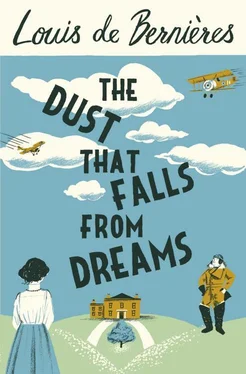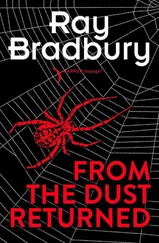She opened the Bible again, put her finger on the page, and opened her eyes. She read the verse upon which her finger had settled. It was the verse that Fairhead had quoted: ‘For the woman which hath an husband is bound by the law to her husband so long as he liveth; but if the husband be dead, she is loosed from the law of her husband.’
She read it several times, and it seemed to her that it could not have been a coincidence that this particular passage had appeared so opportunely before her eyes, even though she knew perfectly well that a book tends to open naturally at a page where it has previously lain open. She reflected for a moment, and then returned to the drawing room, where Daniel was anxiously pacing up and down with his hands behind his back.
‘I will marry you,’ she said.
Daniel had already asked her many times, almost to the point where she began to feel that she was being nagged, and on each occasion she had temporised and prevaricated. At this moment, however, because she believed in divine intervention rather than in chance, she felt herself absolved from her vows to Ash. It was, in its way, a liberation, and for a moment she enjoyed the relief of it. She had been contemplating a life of spinsterhood, not because so many of her marriageable contemporaries had been killed, but because she and Ash had made promises that were binding forever. She could hardly recall anything that Ash had said on the subject of what she should do in the event of his death, because in her own mind she had bound herself to him in perpetuity. She had told him so many times, and she had told herself the same thing for so long, with such vehemence, that it seemed inconceivable that she should ever be attached to another. In her own mind she was married to him, and always would be, but just now these words of St Paul had come to her at a pivotal moment. If she had read on she would have found that he was elaborating a metaphor about the marriage of Christians to Christ.
As for Daniel, he was in love. He had a general feeling about the right time in life to do certain things, an urge to settle, to make something of himself, to relax into domesticity after all the excitement and turbulence of war, to know the sweetness of the marital embrace and the pleasure of having children that one can love and of whom one can be proud. In truth, in that frame of mind he might have chosen any respectable and reasonably attractive young woman. He might have settled on one of the other sisters, and prospered if he had done so.
He had not been able to stop thinking about Rosie, and he could not prevent himself from imagining vividly what it might be like to share a bed with her. Everything about her kept him awake. He lay in bed, sweating and turning, his brain whirling with all the things he wanted to say to her. His impulse upon seeing her was to clasp her to his breast and kiss her neck. In the daytime he would suddenly go into a dream and stop doing whatever it was that he was engaged in. The sky seemed bluer than before, the taste of water more metallic, the thrill of flying more thrilling. His friends remarked, ‘Got a spring in your step, old boy. Nice to see.’
It is often given to people to believe that they are in love, and it is only later that they say, ‘Oh, I was obsessed … It was nothing really … I was fooling myself … I made a mistake …’ This is how nature deceives us into the higher vocation of caring for children. In the case of Daniel Pitt, it is true that some of his love for Rosie consisted of sympathy. There was something about her obvious sadness and persistent distress that made him want to protect and comfort her. He was the kind of man whose heart goes out to the wounded, who feels that the natural role of a man is to be a protector and consoler of women. His mother had brought him up with firm ideas about the sanctity of womanhood, but he had had no sisters, had been to boys’ boarding schools, and then spent his life in adventure. He had no great understanding of women, or of the ways in which they are different from each other. He knew that he loved them in general, that they were attracted to him, and that he wanted this one in particular to be his Beatrice.
Rosie, on the other hand, had already known a very great love, a love that was not temporary, and it was not temporary because its object was no longer there to disillusion her. Her beloved had become an angel, perfect and pristine forever. Even as she said ‘I will marry you’ to Daniel, her little burst of happiness and relief had turned sour in her mouth, and when he had clasped her to his chest, muttering joyful endearments, she had inhaled his fragrance of tobacco and cologne, and remembered that Ash had been much stockier, and smelled only of cologne.
SHORTLY AFTER A séance with Madame Valentine, when the whole tribe was gathered at The Grampians, Christabel arrived, accompanied by her friend Gaskell.
Christabel was a very tall girl with a large nose and a florid complexion. She had stiff golden hair that settled at her shoulders, and typically wore long blue dresses and a slightly old-fashioned bonnet. She moved with lovely physical grace, and had triumphed in every athletic event at school. Her father greatly admired her Amazonian nature, and said to her, ‘My dear lass, I do believe you may be the ideal woman. A beautiful lassie who can run as fast a horse and throw a javelin is an ideal to which few men may aspire. I should have named you Penthesilea. Do let me encourage you to take up golf. You’d become a champion in no time.’
‘Daddy, we’ve played golf hundreds of times. And I am hardly beautiful.’
‘Of course you are. You know there is a kind of person who does not seem beautiful at first sight, but the moment you know them, they are transfigured. You are beautiful after two or three minutes. Everybody says so.’
‘Who is everybody?’ she demanded.
‘Everybody. Tout le monde . The common crowd, the aristocracy, even the King himself, no doubt, were he to meet you. And I say so. And the other girls are quite similar, don’t you think? All beautiful after a minute or two? Sophie’s adorable, is she not? But hardly a conventional beauty. Have you found a young man yet?’
‘They’re all dead,’ she said, adding, ‘I think I might enjoy being a spinster.’
‘Every woman needs a man to torment. She needs someone to upset her, someone to disapprove of, someone whose pleasures she can prevent.’
‘I’ll just disapprove of you, Daddy.’
‘Quite right, lassie,’ he said. ‘I shall approve of you forlornly whilst you disapprove of me.’
Christabel had brought Gaskell home for the first time. Like Christabel, she was tall, but she was much less slender and graceful. Today she affected a monocle, wore tweed plus fours and brogues, with a khaki shirt and tie, like a man dressed for a day’s shooting. Her hair was shiny chestnut, cut quite short and plastered into place with brilliantine. She was smoking fragrant Abdullas from a remarkably long cigarette holder with a silver stem and a meerschaum mouthpiece. Her low drawl as she introduced herself struck Mrs McCosh as alarmingly sensual.
‘What an unusual name, for a girl,’ said Mrs McCosh, immediately suspicious of this extraordinary creature, who was obviously a bohemian of some sort.
‘It’s not her real name,’ said Christabel. ‘It’s her nom de plume .’
‘ Nom de brosse ?’ suggested Ottilie. ‘Daniel, what would it be?’
‘Well,’ said Daniel, ‘by analogy with plume , it would have to be pinceau . That’s an artist’s paintbrush. Une brosse would be for decorating, really.’
‘I mostly use a palette knife,’ said Gaskell.
Читать дальше












